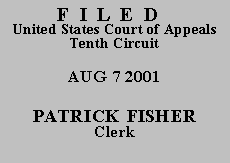

| UNITED STATES OF AMERICA, | |
| Plaintiff-Appellee, | |
| v. | |
| CODY D. GLOVER, | |
| Defendant-Appellant. |
Appellant Cody D. Glover seeks to appeal from the denial of his 28 U.S.C. § 2255 motion to vacate, set aside, or correct his Hobbs Act robbery sentence under 18 U.S.C. § 1951. Appellant challenged the constitutionality of the Act's jurisdictional predicate and this court's precedent approving the same, citing as persuasive authority the dissenting opinion in United States v. Hickman, 179 F.3d 230, 231-33 (5th Cir. 1999) (per curiam), cert. denied, Hickman v. United States, 530 U.S. 1203 (2000). The district court denied both Appellant's § 2255 motion and his application for a certificate of appealability. Appellant then sought to appeal the district court's denial of his § 2255 motion and requested an initial hearing en banc in this court. On March 19, 2001, this court denied Appellant's request for an initial hearing en banc. Pursuant to Federal Rule of Appellate Procedure 22(b), Appellant's notice of appeal is deemed a renewed application for a certificate of appealability.
In order for this court to grant a certificate of appealability, Appellant must make a "substantial showing of the denial of a constitutional right." 28 U.S.C. § 2253(c)(2). To do so, Petitioner must demonstrate that "reasonable jurists could debate whether (or, for that matter, agree that) the petition should have been resolved in a different manner or that the issues presented were adequate to deserve encouragement to proceed further." Slack v. McDaniel, 529 U.S. 473, 484 (2000) (quotations omitted).
The constitutionality of the Hobbs Act's jurisdictional predicate was settled in United States v. Bolton, 68 F.3d 396, 399 (10th Cir. 1995), cert. denied, 516 U.S. 1137 (1996), and reaffirmed in United States v. Malone, 222 F.3d 1286, 1294 (10th Cir.), cert. denied, __ U.S. __, 121 S. Ct. 605 (2000). In addition, the Supreme Court has also denied certiorari in Hickman. See Hickman v. United States, 530 U.S. 1203 (2000). Because the issue is settled in this circuit and not disputed by the Supreme Court, we cannot say that "reasonable jurists could debate whether (or, for that matter, agree that) the petition should have been resolved in a different manner." Slack v. McDaniel, 529 U.S. 473 (2000) (quotations omitted).
For the reasons stated above, Appellant's request for a certificate of appealability is DENIED and the case DISMISSED.
Entered for the Court
Monroe G. McKay
Circuit Judge
*. This order and judgment is not binding precedent, except under the doctrines of law of the case, res judicata, and collateral estoppel. The court generally disfavors the citation of orders and judgments; nevertheless, an order and judgment may be cited under the terms and conditions of 10th Cir. R. 36.3.